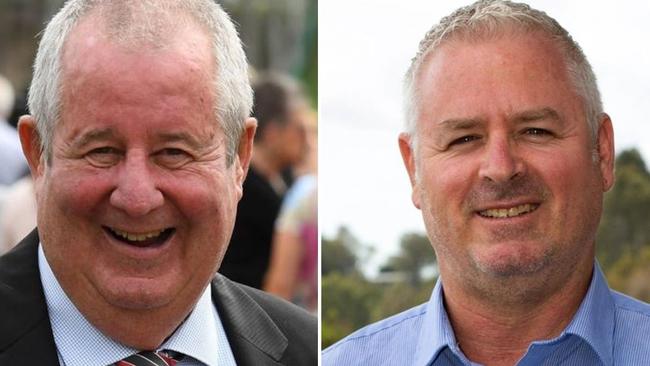Supreme Court rules in case of Shorne Sanders and ECQ
After losing by the finest of margins, Shorne Sanders took the ECQ to court in an attempt to force a re-election in Division 8 of the Bundaberg council. While dismissing the action, Justice James Henry was not altogether kind to the ECQ.

Police & Courts
Don't miss out on the headlines from Police & Courts. Followed categories will be added to My News.
An attempt to have a new election held for Division 8 of the Bundaberg Regional Council has failed, with the Supreme Court of Qld sitting as the Court of Disputed Returns dismissing the action on Thursday.
Bundaberg Division 8 candidate Shorne Christopher Sanders lost the March 16 election by one vote to incumbent Steven Cooper, and has since taken the action against the Electoral Commission of Queensland.
The March local government election was plagued by long queues and wait times in Division 8, and at multiple other booths and cities across Qld.
Justice James Henry in bringing down his ruling that the Division 8 result must stand, acknowledged the ECQ’s “flawed forecast” in predicting how many voters would turn out at the Division 8 booths - about twice as many as were expected.
The resulting wait times of up to and more than an hour were key elements in Mr Sanders’ argument.

He and other witnesses saw multiple people give up and leave before reaching the front of the queues and voting.
According to the court document released on Thursday, Mr Sanders claimed some ballot papers were illegible, but Justice Henry ruled the complaint had “no substance”.
“The evidence does show some voters lost patience with the long queued waiting times and left without voting,” Justice Henry ruled.
“However, for the reasons which follow, that does not justify intervening to order another election. The result must stand.”
Justice Henry did accede there were long queues but said fulfilling the legal obligation to vote necessarily involved a degree of inconvenience to the voter.
“The inconvenience occasioned by the problem with long queued waiting times was not of such a degree that the court should intervene in the result,” he said.
“There is no substance to the other alleged problem of ballot illegibility.”

There was also no evidence that insufficient ECQ staff and long queues and delays had stopped voters from voting.
“Bundaberg Regional Council has 10 divisions,” he said in his ruling.
“Division 8 is located in the east to south east of the city of Bundaberg, within the suburbs of Avoca and Branyan. There were two booths established within it for polling day: the Avoca booth, at the Bundaberg Church of Christ; and the Branyan booth, at Branyan Road State School.
“The Commission appointed a single returning officer for the Bundaberg Regional Council election.
“The Avoca booth had four staff: a supervising officer, a senior issuing officer and two issuing officers. The Branyan booth had three staff: a supervising officer, a senior issuing officer and one issuing officer. There were no queue controllers appointed to either booth or indeed any other booths statewide.
“In determining its election day staffing numbers the Commission forecast the Avoca booth would take 905 votes but it ended up taking 1766 votes.
“The Commission forecast the Branyan booth would take 706 votes but it ended up taking 1401 votes.
“The flawed forecast was at least partly a result of reliance upon voter patterns at the 2020 local government elections.
“In that era the dawning impact of the COVID-19 pandemic apparently skewed some voters’ usual habits in favour of pre-poll voting.
“I accept queued waiting times of 40 to 60 minutes are unusual, particularly for such prolonged proportions of the day as occurred in Division 8 on this election day.

“It is obvious these undesirably long queued waiting time were a result of there being insufficient booth staff to promptly process the larger than forecast number of attending voters for substantial proportions of the day.”
Bult ultimately, Justice Henry concluded there was no way of knowing if those voters who left came back later, or voted elsewhere.
“Division 8 voters had a wide array of choices as to when and where to vote,” he said.
“Division 8 voters who chose to vote on election day were not required to vote within Division 8.
“They could vote in any of the multiple booths a short drive about Bundaberg beyond their own division. Further, booths were open between 8am and 6pm - a long temporal window.”
There was also pre-poll voting options, postal voting, telephone voting and electoral visitor voting.
“It follows from the above reasons that I do not consider it just and equitable to intervene to vacate the division 8 election result and order a fresh election. The application must be dismissed. The result stands.”
Costs are yet to be settled.





